A team of employee-owners from Sebago Technics takes on an 80-ton 747 at the Portland International Jetport, raising funds for the Travis Mills Foundation. Photograph by Mark and Deanna Photography, August, Maine.
When a company is owned by its employees, its level of commitment to and care for all stakeholders sets it apart from competitors. ESOP, an acronym for Employee Stock Ownership Plan, commonly refers now to companies that have adopted this ownership model, often as a way to preserve a company’s founding values and vision. October is Employee Ownership Month: an ideal time to discover the “secret sauce” that makes these seven Maine ESOPs leaders in their fields, as well as rewarding places to work.
Sebago Technics
A way of doing business that is collaborative, caring, and focused on community improvement propels this fast-moving, innovative ESOP.

They are engineers, surveyors, landscape architects, 3D designers, communicators, project managers, executives: But the employee-owners of South Portland–based Sebago Technics aren’t roofers by trade. So, when the entire staff spent last year’s annual day of service prepping Camp Susan Curtis so economically disadvantaged children could embark on a summer’s worth of adventures, the group re-roofing a cabin was still swinging hammers at lunchtime.
Project delivery manager Caitlyn Abbott tells the story that has become something of a legend that beautifully illustrates “the Sebago Way.” Everyone who had just paused to eat, including the CEO and COO, “picked up their lunches, made lunches for the people on the roof, climbed up, and helped until the job was done.”
Mathew Orr, a civil engineer who’s on the Sebago Way Team that organizes charitable and social events like the hotly anticipated annual Chili Cook-off, says camaraderie extends beyond work hours. The moment someone says, “I haven’t been camping in a while,” another employee-owner offers: “You can join me.”
“Nobody hesitates — there is an open spot for you,” he says. “That’s what makes the culture surrounding employee ownership a little bit different: the family values.”
It’s no surprise, then, that CEO Mark Adams’s monthly coffee talks are well attended. Nor that no one burns the midnight oil alone. Abbott says if one employee-owner is staying late to contend with a change request or deadline, “three or four people will usually stop, ask if that person needs help, and stay until it gets done.”


Collaboration, commitment, accountability: All are aspects of ESOP culture that enable this multidisciplinary land-development company’s 107 employee-owners to adeptly handle as many as 175 projects around New England at any given time. As co-owners, “I know whoever I’m working with is going to have the same drive to get a project done correctly,” says landscape architect and project manager Henry Hess. Those projects range from single-house lots to commercial, industrial, and municipal developments, for which Sebago Technics is often tasked with the entire process, from permitting through construction administration.
Sebago’s origin story is the stuff of legend, too. Walter Stinson, who launched the business from his kitchen table in 1981, saw the value in employee ownership long before ESOPs became trendy. More than a decade after his retirement, employee-owners emulate his example every time they pursue new skills, nurture new relationships, and develop new offerings in fields like geomatics.
“There’s a lot of serious work that happens in the building,” Hess says. But there is palpable enthusiasm and immense pride of ownership poured into every housing development, business park, soccer field, and coffee shop.
“We’re all shaping our community together,” says Abbott. “It’s really fun and exciting.”
Allen Insurance and Financial
More than 150 years after its founding, this employee-owned company still prioritizes personal service.
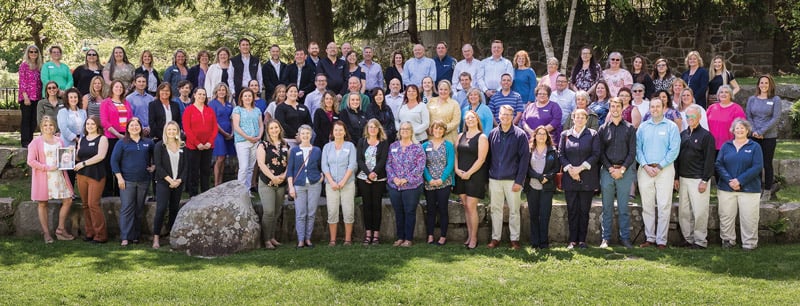
Call Allen Insurance and Financial for an auto insurance quote or to discuss your business’s needs, and an owner always answers. Stop by one of the company’s locations in Camden, Rockland, Belfast, Southwest Harbor, or Waterville, and the owner will be right with you. Email your questions about retirement planning, employee benefits, or Medicare supplement selection, and you can count on receiving a personal response from the owner.
No, the company’s owner isn’t a superbeing who can teleport . . . and never sleeps. Allen Insurance and Financial is 90 employee-owners strong, and that means every customer interacts with an individual who is empowered, accountable, and eager to provide personalized service and solutions.
Originally established in 1866, Allen Insurance and Financial was one of the first companies in Maine to introduce an Employee Stock Ownership Plan (ESOP) back in 1989. In 2017, the company became 100 percent employee-owned. What customers see is an organization that is committed, responsive, and community-minded. There is much happening behind the scenes, though, to ensure employee-ownership culture drives continuous, thoughtful improvement that benefits everyone: customers, team members, and the community.
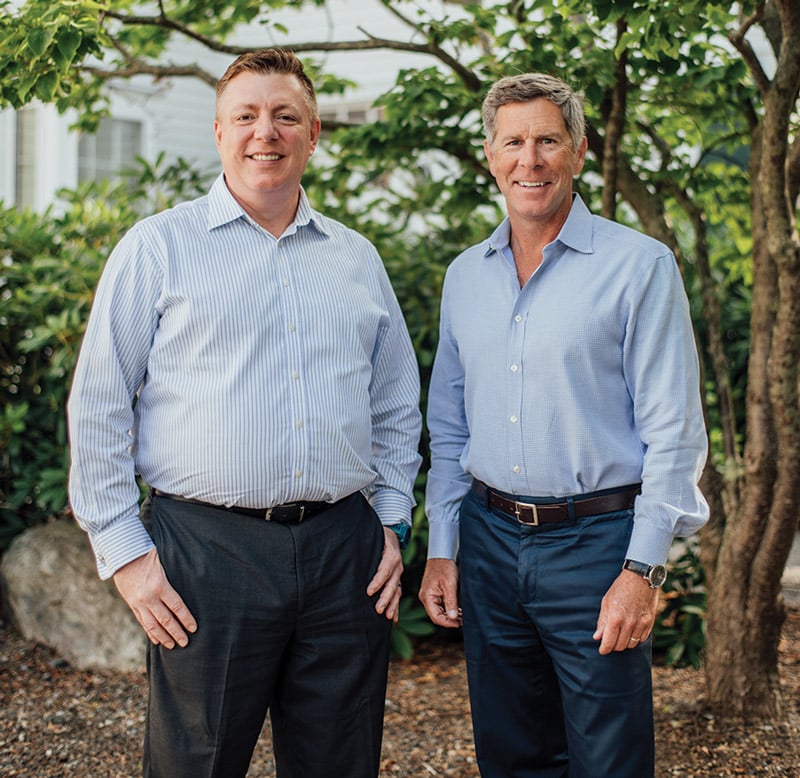
When employee-owners log into the company’s intranet or fill their Nalgene water bottles, they see a different version of Allen Insurance and Financial’s familiar compass rose logo. It highlights four pillars — Trust, Team, Generosity, and Intentional Ownership — that support the company in its mission. They are meant, says communications manager Jill Lang, to encourage workers to reflect on “their role in the success of the company.”
Employee-owners’ shared sense of purpose plays out in small and large ways at this company, named a Best Place to Work in Maine every year since 2012. All suggestions are carefully considered, and there are cash awards for cost-saving or customer-forward ideas, such as providing crayons and coloring books in reception areas. When president Michael Pierce tasked the ESOP Culture Committee with finding a project to draw people together, the result was an annual MLK Day event that aims to fill every seat of Rockland’s Strand Theatre with bags of food for AIO Food & Energy Assistance. In two years, the effort has collected more than 3,000 pounds of food and nearly $50,000 in donations.
Achievements like this fill the pages of an annual report to shareholders, distributed only to those 90 individuals who strengthen the business with every customer conversation, handshake, and hour volunteered. “We’re committed to personal relationships,” Lang says. “Customers are talking with a company owner in their town. That still matters,” she says. “The independent insurance and financial planning firm is very much alive and well in Maine.”
Ted Carter Inspired Landscapes
Employee ownership ensures Ted Carter’s vision and passion will flourish perennially.

Ted Carter is a landscape designer, an ornamental horticulturist, a hands-in-the-earth builder of dreamy environments. He’s an Earth Shaman, too: attuned to and in constant collaboration with the energies of the land and of the creative field from which ideas flow. He is no longer, however, the sole owner of Ted Carter Inspired Landscapes, the business he’s nurtured and helmed since he was a teenage entrepreneur.
Since 2019, the firm’s small, efficient, imaginative group of employees — hardworking individuals who share values like prioritizing the quality of the work — co-owns the company through the implementation of an Employee Stock Ownership Plan (ESOP). It was a move, explains Carter, that was literally less taxing than succession alternatives like gifting. And one that grants him peace of mind that when he is ready to let go of the reins, this entity that has created beauty and sanctuary for so many will continue to thrive.
Talk with Carter about his craft, and he’ll sweep you into a world that is both tactile and spiritual, where the elements of co-creation are simultaneously cutting edge and rooted in landscape tradition. “Creating an environment of enduring beauty has a deep effect on the human soul, not only for those who enjoy the creation but also for those who create it,” says Carter. “The joy of working with your physical body to create something has an enduring and ancient connection to being alive on this planet,” he says, lamenting that so many in our modern world have lost this thread.

Not his colleagues: They are in the weeds, devising innovative solutions, communicating a vision to architects and other partners, building lasting value for owners. The work is complex. It’s spontaneous. Each project is not unlike a child who needs parenting. “We want the best for the child,” says Carter. “Ego has no place when you talk about the work at hand in this way. Perhaps it is this deep abiding belief that drove me to further investigate and implement the ESOP,” he says. Now, each individual feels part of the whole, integral in making the company successful.
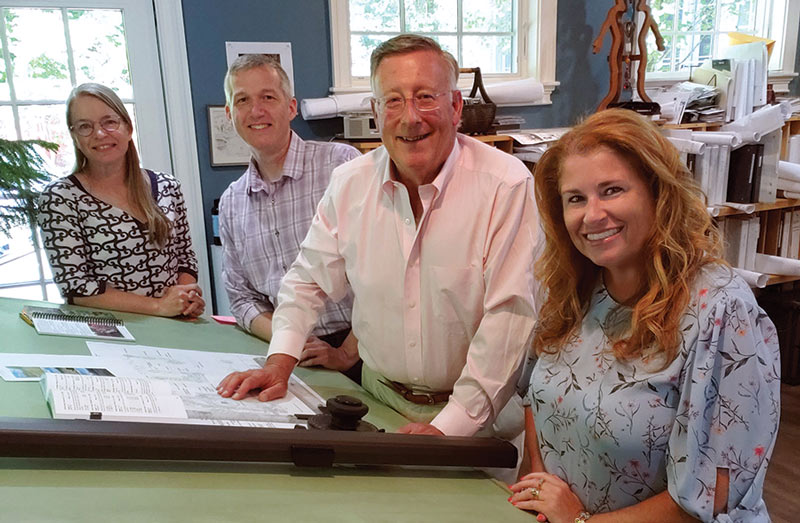
Carter knows no model for retirement that suits him. “At 66 years old, I love being outside and working in the landscape. It keeps me young and feeds my life force,” he says. With the ESOP in place, though: “I can see some light at the end of the road.” He’s planning a big trip, confident the company won’t skip a beat. He’s looking forward, in four or five years, to sitting in on college classes and curtailing his workload to only certain projects, including one he’s backburnered for too long. “I want to build my own dream landscape!” he says.
Systems Engineering
Devotion to clients, employee-ownership culture, and community makes this security-focused IT services firm a mighty force for good.
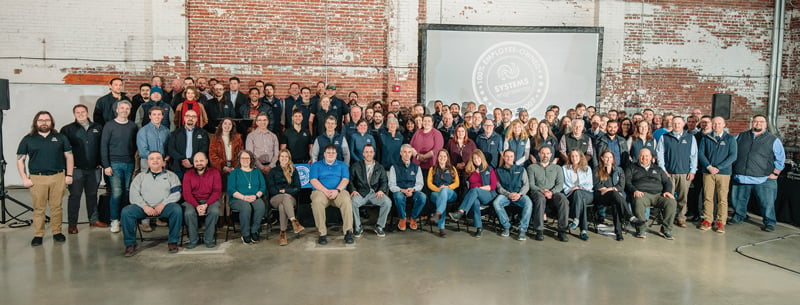
The annual share-price reveal event is a pivotal moment for ESOPs like Systems Engineering: a Portland-based IT services company with clients nationwide. “Our share price is the tangible result of our collective work,” explains Jen Hughes, director of People & Culture for Systems Engineering. Last spring’s employee-owner gathering was the first in-person reveal event for Hughes since coming aboard in 2020. “The lively energy in the room proved that through the challenges of the past few years, our resilience was the result of strong connections that were never lost,” she says.
Knowing that Systems Engineering has consistently been named one of the “Best Places to Work in Maine” and is 100 percent employee-owned were major decision factors for Hughes as a new hire. An ESOP by nature is a long-term wealth-building tool, but it’s the culture that provides immediate rewards.
Systems Engineering’s ESOP culture is one of accountability and dedication to exceptional outcomes. “Although employee-owners may not get a vote in every decision, they do have a clear voice,” explains president and CEO Matt McGrath. “Our culture empowers employee-owners to serve clients as if they own the company . . . because they do. They have transparent access to financial data, where they can see the direct connection between hard work and organizational outcomes.”
The company’s 178 team members are granted time and financial resources to pursue degrees, certifications, and tailored educational opportunities. “Continuous learning is a cultural cornerstone,” says Hughes. They are also rewarded handsomely for referring new employee-owners: Half of the company’s hires are discovered this way. In an industry known for turnover, Systems Engineering has a remarkable 90 percent employee-retention rate. Workforce stability earns client trust and loyalty, as does the expertise and round-the-clock availability of Systems Engineering’s highly technical team.

Systems Engineering focuses decision-making on the long-term impact to clients, culture, and community. Just this year, a new Community Impact Committee was created, composed of a dozen employee-owners. This committee is empowered to decide where 100 percent of community initiatives are directed. The company is committed to donating 10 percent of annual profits to charitable organizations, and each year, employee-owners are encouraged to utilize eight hours of paid volunteer time: enabling the company to have an even broader impact.
As an employee-owner and leader, McGrath envisions Systems Engineering as an “infinite organization” that plans to “be here forever” with “no finish line.”
“We are a material player in keeping New England competitive,” McGrath says. “When we’re successful, everybody wins.”
Knickerbocker Group
Behind every stunning home is a team of employee-owners invested in the work — and in each other.

With its commitment to client-driven design, and to supporting Maine creators and protecting Maine’s environment, Boothbay- and Portland-based Knickerbocker Group has distinguished itself as a design-build firm with a unique ethos. In 2023, the company will celebrate 45 years of listening intently, finding solutions, customizing, collaborating, communicating, seeing things through, and making dreams come true. And six years of focusing on providing these same touchstones for nearly 100 team members, who all became employee-owners in 2017.
The ESOP model “didn’t change us: It fit us,” says Knickerbocker Group president Danielle Betts. “If anything, it helped us recognize our culture’s power and importance, which motivated us to work even harder to protect it.”
Debbie Hilscher, director of people and culture, says the organization strives to ensure employee-owners live their best professional and personal lives. Her focus this year is on creating professional-development plans that build on employee-owners’ strengths and provide opportunities for skills building and nonlinear career paths. “Many people start in one position and end up in another,” Hilscher says. Two employee-owners in former administrative-support roles, for example, are now managing sales and real estate. A former assistant project manager is now overseeing construction projects and supervising a team. “We are good at recognizing people’s talents and supporting change to help them realize their full potential,” says Hilscher.
The ESOP Communications Committee regularly shares fun facts about employee-owners, stories that deepen understanding of everyone’s roles, and “high-fives” between colleagues. “We strive to recognize each person’s contributions,” she says.

The committee also recently created a “Solution Box” to provide an avenue for all employees to have a voice. “We thoughtfully consider every single submission,” Hilscher says.
No matter the size, what is evident in every gathering of KG co-owners is: They have fun with each other. It’s a company culture cultivated from the beginning by founder Steve Malcom. Hilscher says, “You could work anywhere else, and you would have a job. Here, you have a community. You have a family.”
Social events are frequent: Many are devoted to community good. There’s a creative energy, too, that enlivens workdays. “Everyone who works here is passionate about homes, landscaping, and real estate,” Betts says, so there are animated exchanges about “what works and what doesn’t work.”

That dynamic spills over into passion projects, which have turned into new lines of business. The Innovation Team’s mission is to incubate the ideas of employee-owners. Derek Libby, a site manager, for example, drives the implementation of new products and methodologies, collaborating first with the architect and construction-practice leaders before testing in the field, which he documents in videos and posts to the company’s web portal. Julien Jalbert, a licensed architect, and Bill Burge, a construction manager, are spearheading an initiative to bring sustainable housing to more Mainers, which aligns as much with their professional talents as their personal values.
Ultimately, what clients experience is a process that feels authentic, joyful, and inspired. “We are so lucky we get to build beautiful houses and work with people embarking on one of the most exciting chapters of their lives,” Betts says. “There is so much positive energy surrounding that.”
Hilscher adds, “To build an amazing house, beginning to end, we have to work well together.” ESOP culture fosters collaboration and happiness: essential elements for delivering dreams.
Home Grown
With a lift from Spinnaker Trust, Johnny’s Selected Seeds flourishes, while remaining true to its roots.
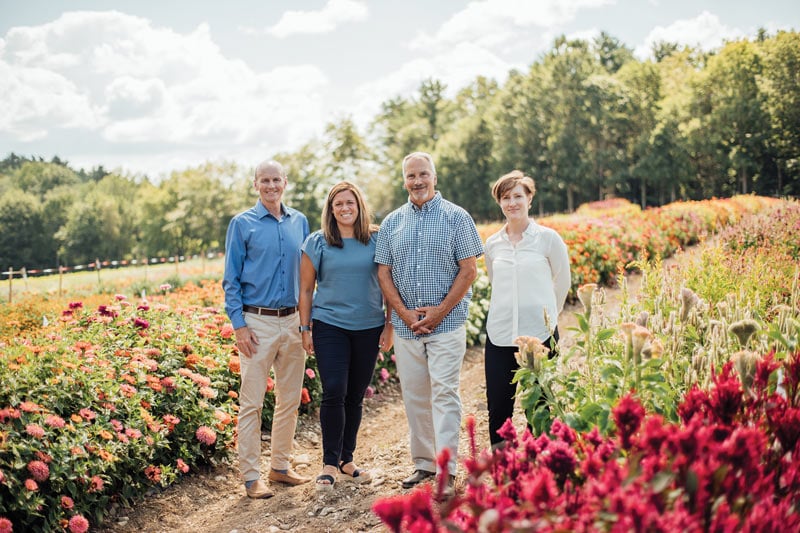
In 1973, Rob Johnston Jr. launched Johnny’s Selected Seeds with $500 in savings and a dream of helping families, small-scale farmers, and avid home gardeners produce healthy food. The company has flourished in the decades since, breeding and distributing hundreds of seed varieties from its research farm in Albion and gaining national renown for its best-in-class products and its legendary customer service.
When Johnston wanted to plan for retirement, an Employee Stock Ownership Plan (ESOP) was a natural solution. It provided an exit strategy that would ensure the company he built, the culture he’d cultivated, and the livelihoods of the hundreds of people he employed would be sustained long after his departure. Since the company became 100 percent employee owned in 2012, it has continued to grow, doubling the size of its staff to 270 and adding hundreds of new products.
A key part of making the ESOP a success, chief executive Dave Mehlhorn says, has been working with their external trustee, Portland-based Spinnaker Trust. In addition to eliminating potential conflicts of interest and taking complex trustee duties like trust accounting, determining the value of company stock, and distribution processing off the shoulders of company management, having Spinnaker on board provides a valuable big-picture perspective. Spinnaker works with more than 50 ESOPs throughout New England, ranging from engineering firms to construction companies and grocers, as well as a dozen different valuation firms and ESOP lawyers, so the firm can provide guidance on regulatory issues, taxes, and complex valuation issues.
“Spinnaker has worked with so many different kinds of companies and has been exposed to so many different situations, they can help build a stronger set of standards and controls,” Mehlhorn says. “With an internal trustee, you just can’t do that in the same robust way.”

What’s more, Mehlhorn says, ESOP participants draw peace of mind from having Spinnaker involved.
“They get a high level of confidence knowing that they have an independent professional with expertise, who has a fiduciary responsibility to look out for their best interests,” he says.
For Spinnaker Trust, helping ESOPs like Johnny’s Selected Seeds thrive, and ensuring that the ESOP participants are able to realize their own retirement dreams one day, is a natural extension of the company’s own mission to help individuals, foundations, and organizations plot out financial futures around their needs and goals.
“It’s extremely rewarding to work with ESOPs and help these businesses remain successful and sustainable as independent businesses, as well as to ensure their employee-owners have a promising future,” says Laura Pfeiffenberger, Spinnaker Trust’s vice president and ESOP advisor. “That pride in ownership, fierce sense of independence, and self-sufficiency is a big part of what makes the people, the businesses, and the communities of Maine so special.”
Slalom
Global purpose-led consulting firm lays roots in Maine, bringing innovation and transformation to the Pine Tree State.
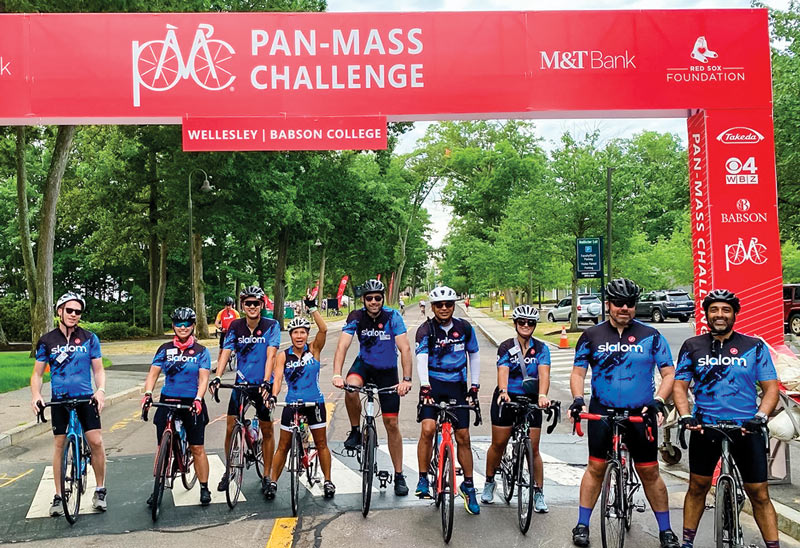
Maine has perfected the meaning of work/life balance. With its vibrant culture, the people of Maine are committed to bettering their community while also wholeheartedly enjoying it. So, for international consulting firm Slalom, a company that wants all people to love their life and their work, expansion into Portland only made sense.
“We’ve been working in and out of Portland for years,” Russell Norris, General Manager of Slalom Boston, says. “But now our local presence gives us an opportunity to make an impact within a community that is meaningful to us.”
“Maine, and Portland in particular, is a place where people are heavily involved in activities beyond their own work lives,” adds Slalom’s Maine Territory Lead Molly Plaisted, who lives in the Portland area. “Almost every company we work with is committed to partnerships with nonprofits working toward more inclusivity and equality,” she says.
This makes Maine a perfect fit for a privately held company with deep commitments to social responsibility. Slalom, a $2 billion privately held company employing 13,000 people across 43 markets globally, uses strategy and technology to help its clients grow, optimize, and transform.
Plaisted points out that many local companies — from healthcare and retail to unique niches like lumber and veterinary services — strive to build a better future for Maine but need the resources and technology to do so. “We support their journey toward digital acceleration, working alongside our clients to turn their visions into reality,” Plaisted says.

Russell Norris, Molly Plaisted, and Natalie Kent are the core team building Slalom’s presence in Maine, expecting rapid growth of local talent. Photo by Dave Waddell
Norris adds, “Through Slalom, they get access to world-class talent and an organization that understands the community and is invested in its long-term success.”
Being a privately held company is “where a lot of the magic happens,” he explains, citing the extra effort that Slalom employees put into making connections with their Maine neighbors and business partners. “People want that employee-owned mentality — that sense of ownership and pride,” Norris says. “With it, our employees feel empowered to make differences and change the world.”
He points to Slalom’s participation in the Pan-Mass Challenge, the largest fundraiser for the Dana-Farber Cancer Institute, as a recent example. “This year, we had more than 20 employees from Slalom come together to ride, raising over $60,000 for cancer research,” Norris says.
“We’re continuously striving to amplify people’s voices and make an impact, which is why our culture and values align incredibly well with the culture and values of Maine,” Norris concludes. “We’re thrilled for this opportunity to make Portland home.”










